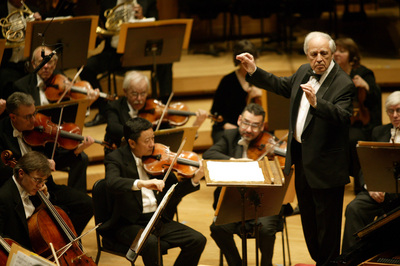Chicago Symphony, Pierre Boulez returning for rare appearance
I was catching up with a good friend in Chicago last week, a pianist who knows — and relishes — a good concert when she hears one. For her, the musical highlight of an admittedly early 2010 was a Chicago Symphony Orchestra concert she’d just attended. “Boulez was conducting, and there was Ravel to start, then this amazing flute concerto for Mathieu Dufour,” she said.
“And then ‘Bluebeard’s Castle,’ the Bartók opera, right?” I interrupted. “Yes,” she said, “It was incredible.”
“We’re hearing that same concert in Ann Arbor on January 27,” I told her.
So now I’m telling you: I think we are in for a treat.

Pierre Boulez conducts the Chicago Symphony Orchestra.
photo by Todd Rosenberg | courtesy of the Chicago Symphony Orchestra
The Ravel in question is the “Tombeau de Couperin,” a suite Ravel wrote for solo piano and later transcribed for orchestra, magnificently shading and sharpening the work’s harmonies and colors in the process. The flute concerto is a 2006 work by Marc-Andre Dalbavie that showcases the CSO’s amazing principal flutist, Dufour. And “Bluebeard,” rarely heard, gets an airing by a top orchestra and 2 soloists, mezzo Michelle DeYoung as Judith and bass-baritone Falk Struckmann as Bluebeard, who have made the opera something of a specialty.
In Wednesday’s performance here, English supertitles help the audience understand the action (the opera is in Hungarian) as Judith, Bluebeard’s latest wife, discovers the mysteries, and horrors, behind each of seven doors in Bluebeard’s castle. Chicago Symphony Orchestra, conducted by Pierre Boulez, performing Stravinsky's "'Pulcinella': Allegro Assai" on their brand-new CD, "Stravinsky 'Pulcinella' / Symphony in Three Movements / Four Études," out January 26.
DeYoung, speaking from a cell-phone-friendly spot in the Chicago Museum of Science and Industry on a day off last week, has performed “Bluebeard” both in concert and on stage.
“It’s usually done in concert, though,” she said. “One of the reasons is it’s only an hour long. If you do it on stage you have to do it with at least one other opera, so it’s hard to program.”
But Struckmann has been her partner in both concert and stage versions. “The stage version was really bizarre,” she said, describing how there were no doors and no castle (“People really expect doors,” she said), and how Struckmann was in a wheelchair and she was dressed as a nurse.
“It had nothing to do with the story. When you do it in concert, you get to interpret it way you interpret it. Falk and I get so much energy just standing together. And it changes every time. Sometimes, as Judith, I’m more afraid, sometimes I’m more manipulative, sometimes stronger. The stage is not that way.” The part of Judith, DeYoung admits, is a daunting one, and not just because it is in Hungarian, a language most singers don’t have in their quiver of tongues.
PREVIEW |
“It is difficult to learn,” DeYoung agreed about singing in Hungarian. “I had a lot of private tutoring on it, working with a couple of different Hungarian conductors. I’m glad I know it now — I enjoy it, but it took me a while to say that. There are certain sounds that I love.”
But, she added, part of the reason the opera is not done a lot is that the role of Judith, particularly, is “just very hard to sing.”
“It’s very demanding, mostly on the female.character,” she said. The part goes very high, to high C, and very low, so there is a large range. And sometimes the singing is very gentle and light, and then it is also very dramatic and loud. You need a lot of flexibility in the voice, a large voice that’s controlled and an excellent ear because it’s Bartók. I love the challenge of it. It’s rewarding and tricky to sing.
“It is honestly one of the best pieces. It’s one of my husband’s favorites, and it seems like everyone loves it, from people who are into classical music to people who don’t know much about it. It has beautiful melodies, drama, craziness, calm — it is so amazing what is compacted into this little hour-long opera. The story is very interesting, and Bartók is so good at the way he writes music, you can hear the story in music.”
Which is just what my pianist friend in Chicago told me.
Susan Isaacs Nisbett is a free-lance writer who covers classical music and dance for AnnArbor.com.
Pierre Boulez talks about Beyond the Score®, Bartók, and Miraculous Mandarin:

